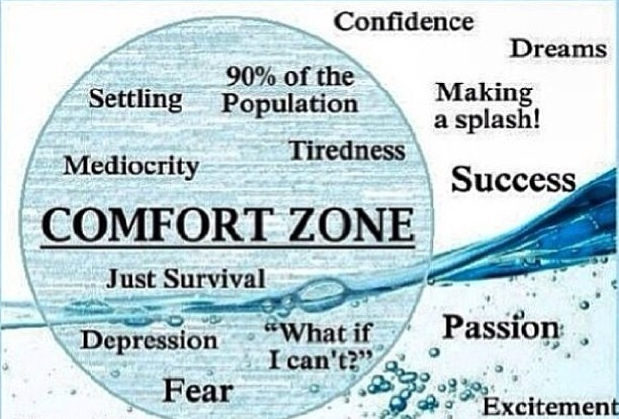Don’t Let Fear Stall Your Career – Four Don’ts and What to Do About Them

A fashionably dressed woman glides into my office, a tall cup of steaming java in her hand. She settles down into the chair across from me, ready to discuss the state of her career. She has worked hard to succeed in her current job, giving her a sense of both pride and satisfaction.
Recently, however, she complains of feeling bored and restless.
“I don’t feel challenged,” she says in an exasperated tone. “Everything is so same old, same old. I like my team and my manager, but I’m only half there most of the time.”
Has she considered changing jobs or applying for a more challenging project?
“Well, kind of. A friend of mine just moved into a new job with a lot more responsibility. I envy her excitement.”
“Enough to inspire you to go after a bigger role?”
She shrugs her shoulders and sighs. “Not really. There’s a new management position opening up that looks tempting, but . . . I dunno . . .”
Then out pops one of the four “don’ts”:
- “I don’t qualify for that job, because I haven’t done everything the position requires.”
- “I don’t want to lose control over my work/life balance.”
- “I don’t do politics.”
- “I don’t do planning.”
Disengagement from your job could be a sign you are ignoring something important. You also might be sabotaging yourself without intending to do so. The four “don’ts” all come from the same place: avoidance of the scary business of mastering the skills, behaviors and responsibilities demanded by new opportunities.

Fear: The Scariness and Adventure of the New
The new is scary. When leaving the comfortable familiarity of a job you know to take on one you do not know, you will encounter the many risks that go with change. A new job could lead to awkward mistakes as you figure out a different organizational landscape. Your former peers might choose to criticize rather than support you. You discover that learning new skills shakes your self-confidence. Yet, entering the uncomfortable zone of the new is where stimulating work lives. Running away from it could leave you stuck in a place that no longer works for you.
How do you become unstuck?
Face your fear and move forward.
Use your nervousness as a motivator. It signals you are on your way to something different and better. Fear of the new is normal. Advancing your career means embarking on a discovery mission to figure out what dream you want to pursue, the skills, steps, and political buy-in needed to get there, and who will help you along the way.
The mission starts with learning what you need to know about yourself and how you might be falling into the trap of the Four Don’ts.
The Four “Don’ts” and What to Do About Them
What are the four “don’ts” that can undermine your career, and what can you do about them?
I don’t qualify for that job because I haven’t done everything it requires.
Said differently, “I don’t see myself that way.” Self-perception is a powerful driver. Both men and women struggle with self-confidence, but for all their considerable achievements, women continue to be particularly dogged by a confidence gap.

An HP study found that while men would apply for a promotion when they met only 60 percent of its requirements, women would only when they met 100 percent. The reasons for the difference ranged from life history to brain chemistry.
Regardless of the cause, the cure requires you to accept rather than flee from your discomfort with learning new things to elevate your career. Those new things could include public speaking in front of unfamiliar audiences, making smart decisions that might be unpopular, or launching a novel program for an important but complicated cause. Whatever scares you, remember that growing pains go with moving up to something better.
The key is to focus on the thrill of accomplishment, learn from each experience, and seek feedback from others to further build skills and self-confidence.
I don’t want to lose control over my work/life balance.
A design firm asked me to investigate its steady loss of emerging women leaders. The firm hired equal numbers of entry level men and women, but ten years later, most of the women had left.
What happened? We uncovered many issues, from lack of internal sponsorship to inadequate training programs. Then came a surprise. In interviews of a large cross-section of employees, I heard the same refrain.
“I prefer doing projects. I don’t want a leadership role, because then I’ll lose control over work/life balance. Instead of going home to have dinner with my family, I’d be trapped at some client dinner.”

There is no doubt that increased responsibility requires more time. It doesn’t obligate you to give your whole life over to your career. However, to get ahead you need to allocate your time strategically. Cultivation of clients is critical to leadership. Periodic client dinners can feel uncomfortable while you build relationships, but it’s worth the payoff of strengthened ties.
Also effective is an ongoing practice of actively listening to clients, surfacing unspoken needs, and focusing on their success, all of which can be accomplished during the business day.
Managing work/life balance is important. In doing so, it is also important to remember the positive attributes of higher-level positions—creating strategy, enriching the careers of others, and participating in firm decision making—and to find a place for them in your career aspirations.
When I asked the design firm interviewees if those positive attributes interested them, I heard a resounding, “Yes!” That realization led several of them to redirect their sites toward leadership roles.
I don’t do politics.
To many, politics is a dirty word. They equate them with using people, stepping over them to gain a higher position. In fact, politics are about connecting with others to align your interests. They are messy, because people are messy, but you won’t win without them.
Careers cannot be advanced without help. Politics become relevant when you identify a dream you want to achieve, then have to seek out who can provide the information, influence, and approvals to make it happen. It involves entering the uncharted territory of understanding what motivates people, being there when they need you, and establishing trust.
Investing your energy in developing the right alliances will enable you to achieve your dream when the time comes. Without laying the political groundwork, there is little chance of it.
I don’t do career planning.
Resistance to career planning is common, at all levels. When a Seattle executive group surveyed its members, over 80 percent admitted spending no time planning on it. It is worth noting that several were “in between jobs” at that moment.
To many, career planning sounds tedious. Who wants to write up all those dull lists of people and ideas? They also might hold the subconscious belief that not planning will allow them to avoid trying something new that could fail. Whatever the reason, creating a career plan will lead to more rewarding work.
In fact, if you don’t take charge of your career, others will, and not always to your benefit.
Keeping a great job has become more difficult. Companies now routinely reorganize, merge with other companies, or reduce workforces to fund changes in strategic direction. While talent remains critical, just as employees are taking a short-term view of their commitment to employers, employers are churning through their workforce faster to focus on top talent. If you are not paying attention to what your company needs, you might find your skills are no longer relevant.
Developing a career plan is not only desirable, in today’s job market it’s essential. Even better, planning will give you a sense of freedom as you dare to dream about what you would love to do and design a pathway to arrive there.

The Value of Turning “Don’ts” into “Do’s”
Nobody said change is easy, but not changing is harder, especially in the world we now live where constant change is the norm. Never has it been so important to chart a course through all the shifting sands and to see them not as a threat, but as a great adventure.
Give yourself the gift of daring to dream of something better, face your fear, and go for it! You’re worth it.
This guest post was authored by Julie Benezet

–Julie Benezet spent 25 years in law and business, and for the past 17 years has coached and consulted with executives from virtually every industry. She earned her stripes for leading in the discomfort of the new as Amazon’s first global real estate executive. She is an award-winning author of The Journey of Not Knowing: How 21st Century Leaders Can Chart a Course Where There Is None. Her new book, The Journal of Not Knowing, offers a self-guided discovery mission to pursue one’s dreams and overcome the scariness along the way to achieving them. She can be reached at www.juliebenezet.com

